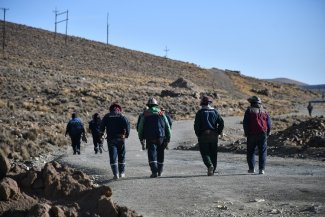“Everything has changed in our life. What I feel here is a general feeling of terror. That we will all starve. Not simply that we will remain jobless but that we will starve,” says Irini Kyriakopoulou, an unemployed mother.
“For the first time in my 38 [years] I can’t pay my bills. The IMF has ruined my life. The life of my family, the life of my friends, the life of my unemployed friends. They have taken everything. I will never forgive them,” says Georgia Koustsoukou, an Athens metro worker.
Irini and Georgia have no doubt that the social and labour advice of the International Monetary Fund (IMF) and of other institutions, such as the European Commission and the European Central Bank, the so-called “Troika”, has pushed their country into recession, have made living conditions worse for their families and are making people poorer.
These and other workers’ stories are included in the ITUC Frontlines 2012 report.
The report was released at the start of the annual meetings of the IMF and the World Bank Group in Tokyo, and a few days after the World Day for Decent Work.
It also comes the day after Angela Merkel’s visit to Athens, which saw thousands of people demonstrate against the excessive austerity policies.
The report gives an overview of global economic conditions and a snapshot of the situation in Bulgaria, the Dominican Republic, Greece, Indonesia, Nepal and Zambia where growth, jobs and workers’ rights are in sharp decline.
Frontline 2012 also debunks some of the myths promoted by advocates of austerity.
For example, it reveals that in Greece the total government expenditure as a percentage of GDP was consistently below the EU 15 average between 2001 and 2007.
Bulgaria, which has implemented all of the flexible working conditions promoted by the IMF, has some of the worst rates of poverty in Europe.
And even where the minimum wage has been reduced, like in the Dominican Republic, inequality continues to rise despite economic growth.
The country’s increasing poverty rate sets the country apart from other Central and Latin American success stories where labour rights have been maintained.
Sharan Burrow, General Secretary of the ITUC, said the rise in attacks on working people stem from a crisis of political leadership where the interests of banks and financial institutions are put before people.
“Trillions of taxpayer dollars have been transferred to banks in direct grants or guarantees, while working people have had their wages and benefits slashed.
“From Greece to Indonesia people are taking to the streets to show their anger. If we do not reverse these attacks on workers’ rights, we will see more political instability and social unrest,” said Burrow.
According to a recent ITUC poll, 58 per cent of the general public think their country is going in the wrong direction, and 67 per cent do not think that voters have enough influence over economic decisions.
On Tuesday, IMF chief economist Olivier Blanchard had to admit the Fund’s wrong forecasts about the macro-economic impact of austerity (or “fiscal consolidation” or deficit reduction) policies that many countries have applied since 2010.
Although the IMF recognises that the recessionary impact of austerity policies has been far stronger than expected, it offers little change to the general policy platform it has put forward over the past two years.









